Rudman Center Roundup: Free Speech, Federal Indian Law, Immigration, Constitutional Dynamics

A Rudman Center Roundup
Rudman Center events this fall included discussions on the balance of power between state and federal constitutions; the rewards and frustrations of practicing immigration law; foreign policy views of congressional candidates; the rights and responsibilities of free speech; and Federal Indian Law, including key. court decisions affecting tribal sovereignty.
See below for more on all our fall events, with links to writeups.
Stay tuned for Rudman events in the coming months, including discussions on bias in technology on Feb. 10; the impact of ever-rising healthcare costs on our nation's finances on March 13; and funding debates that have shaped the separation of powers doctrine in New Hampshire, on March 26. Our New Year’s recommendation for you: This 2013 PBS film, Warren B. Rudman Remembered, about the namesake of our Center.
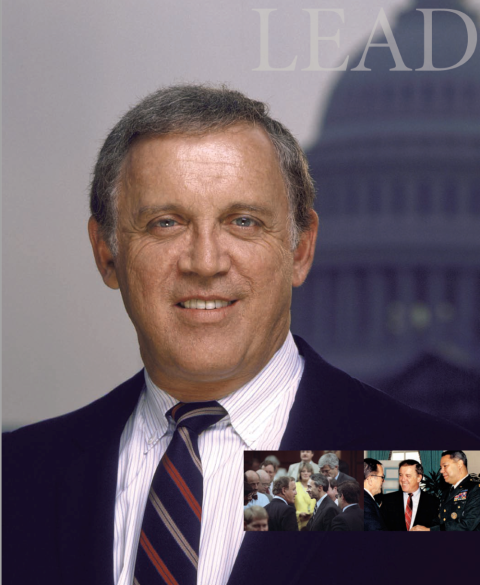
Senator Warren B. Rudman
Senator Rudman was known for his fierce independence and integrity, described by Democratic U.S. Senator Jeanne Shaheen in this way during the 2013 memorial service: “He didn’t shrink from holding anybody accountable, even the president of his own party, when he served on the congressional panel investigating the Iran-Contra Affair. Nor was he reluctant to hold his fellow senators accountable, when he chaired the ethics committee.”
Former Republican U.S. Senator Kelly Ayotte praised Senator Rudman’s dedication to the rule of law and his work on budgetary reform. Ayotte, who is now Governor-Elect of New Hampshire, said during the 2013 service that Rudman was deeply respected by both sides of the aisle “for his commitment to fairness, truth, independence.” Rudman, she said, described himself as “an American first and a Republican second.” “That comment reflected his fundamental commitment to putting our country first,” Ayotte said. “And it provides a powerful reminder to those who are in office today that we all serve a cause that is greater than any political party.”
_________________________________________________________________________________
Anna Brown Begins as New Rudman Center Director
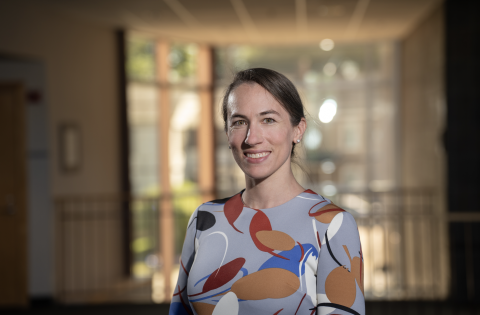
Anna Brown, Rudman Center Executive Director

|
This fall, Anna Brown, one of New Hampshire’s leading experts on state government and policy, joined the Warren B. Rudman Center for Justice, Leadership & Public Service as executive director. Brown took over for Professor John Greabe, who stepped down after serving as director of the Rudman Center for five and a half years and leading it during a time of significant growth. For more than 10 years, Brown has served as executive director and director of research and analysis for Citizens Count, a nonpartisan nonprofit that tracks state legislation and policy, profiles candidates for state and federal office, and builds connections between citizens and their elected officials. She is a frequent commentator in local media on matters of New Hampshire policy and governance. Read more about Anna Brown here.
|
__________________________________________________________________
2024 Rudman Scholarships Awarded to Daniel Devisate Lopes and Lexi Turner
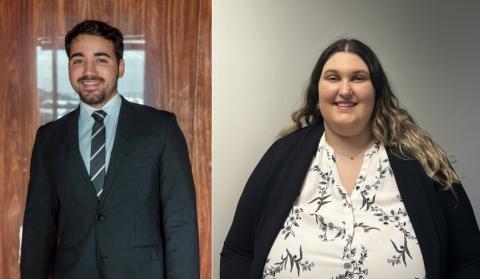
Daniel Devisate Lopes and Lexi Turner
In August, the endowed scholarship committee awarded Rudman Scholars scholarships to Daniel Devisate Lopes ‘25 and Lexi Turner ‘26. Lexi and Daniel have served as wonderful Rudman Center ambassadors, participating in events and public service initiatives. Read more about our Rudman Scholars here.
_________________________________________________________________________________
Constitutional Dynamics: State vs. National Governance

Panelists Haley DeYoung, Professor Julian Jefferson, and Ovide Lamontagne
In observation of Constitution Day, panelists explored the significance and history of the New Hampshire Constitution and how it interplays with its federal counterpart, the U.S. Constitution. The discussion was presented by NH Civics and the Rudman Center. For our write-up, visit here.
What some people don’t realize is that the U.S. Constitution provides a floor. That is, you can go no lower than that in guaranteeing somebody’s rights. But the lion’s share of the work being done to protect your individual rights and to advance what it means to have rights as an American citizen is really done in the 50 states. They are the individual laboratories that advance who we are as we become this more perfect union.
— UNH Law Prof. Julian Jefferson
____________________________________________________________________________
A Conversation with Immigration Attorney Enrique Mesa
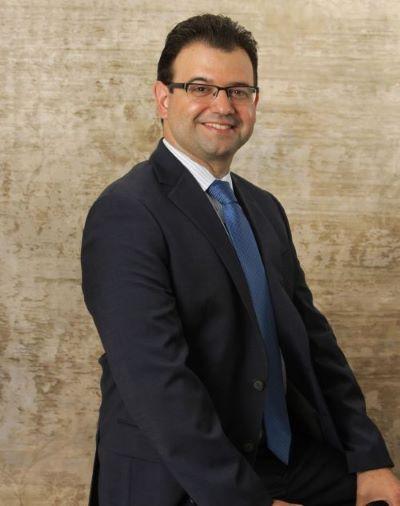
Attorney Enrique F. Mesa Jr.
In October, the Rudman Center welcomed Enrique F. Mesa Jr., immigration attorney and managing partner of Mesa Law, PLLC. Mesa discussed his 17 years practicing immigration law in New Hampshire, including his extensive work on asylum cases. Many of Mesa Law’s clients come from Honduras, El Salvador, Ecuador, and Colombia, each facing unique challenges that drive people to flee. For our write-up, visit here.
I’ve always enjoyed fighting for families to stay together. When you win for that family it’s a great feeling. But the opposite side of that is, if you lose a case, it’s very frustrating because ultimately you don’t want this family separated. We’re talking about somebody with a wife and kids, and you don’t want them to be deported back to their country. So, when you win a case it’s a great feeling. And the whole goal is to win more than you lose. — Attorney Mesa
_________________________________________________________________________________
Congressional Candidate Forums

Maggie Goodlander and Lily Tang Williams
This election season, candidates for New Hampshire's Second Congressional District Democrat Maggie Goodlander and Republican Lily Tang Williams discussed critical foreign policy and national security issues facing the United States during forums presented by the University of New Hampshire Carsey School of Public Policy, the Rudman Center, and the World Affairs Council of New Hampshire. Tim Horgan of WACNH moderated the discussions. Visit here for more on these forums.
___________________________________________________
John M. Gasaway receives 2024 Bruce E. Friedman Pro Bono Award
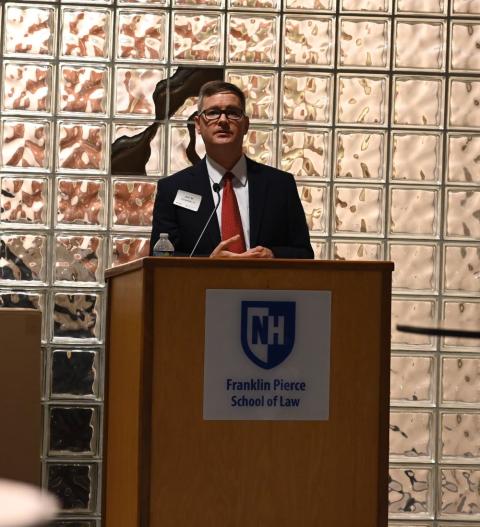
John M. Gasaway Jr.
During a ceremony at the law school, attorney John M. Gasaway Jr. received the 12th annual Bruce E. Friedman Pro Bono Award for his work with survivors of domestic violence. Gasaway, a prosecuting attorney at the New Hampshire Department of Safety, described a “huge need” for pro bono help in New Hampshire. Read more about Attorney Gasaway and this award here.
Getting a final protective order can often make the difference between life or death. In his five years of pro-bono service, John has donated over 200 hours to helping these survivors. And so, the number of lives that he’s changed, and perhaps even saved, is just incalculable. — Maggie Florino, DOVE Project Coordinator and Domestic Violence Specialist at 603 Legal, speaking during the award ceremony.
_________________________________________________________________________________
A Conversation on Free Speech with Former ACLU President Nadine Strossen

Nadine Strossen
During a discussion on the rights and responsibilities of free speech, First Amendment scholar, Professor Emerita, and former ACLU president Nadine Strossen called the struggle between freedom of expression and the fear of the negative power of words an “eternal” one. Still, she said, “I think that the historical record should convince us that no matter how great the potential harm of the speech, the potential harm of censorship is even greater.” Read our writeup here.
We hear about disinformation, extremist speech, hate speech. But how much do we hear about the unprecedentedly effective power of the new media to counter hate speech, to counter extremist speech, to counter disinformation? — Nadine Strossen
_____________________________________________________________________
Tribal Governance and Federal Indian Law: A Conversation with Judge Arthur Gajarsa

Judge Arthur Gajarsa and Laura Knoy of the Rudman Center
In November, Judge Arthur Gajarsa shared his experiences representing tribal interests before this country’s highest courts. Judge Gajarsa discussed key cases that have formed the foundation of Federal Indian law, as well as ongoing debates involving tribal sovereignty. Gajarsa is Jurist-In-Residence at the UNH Franklin Pierce School of Law, where he also teaches Federal Indian Law. In the past 25 years, the U.S. Supreme Court has ruled frequently against tribal interests, he said, with a few notable victories. Still, he said, some recent developments have given him hope. For our writeup, visit here.
The process right now is self-government, which I think is helping to tip the balance of justice in their favor, which is the beginning of an equilibrium. It's never going to be equal. It's never going to be totally corrected, but at least we're in the process of trying. And that's important. The federal government has a trust responsibility to protect their interests. — Judge Arthur Gajarsa

